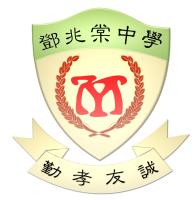| Language Policy |
In order to better develop students' abilities in English learning, junior secondary students are streamed according to their language abilities. As for senior secondary, Students may option for the EMI stream, so as to better equip themselves for their future studies. Apart from organising different English-speaking functions on the campus, the NET also conducts oral exam practices with senior students and teaches in various classes to increase students' exposure to native English speakers. Moreover, theme-based English curriculum/topics are introduced in S.1-S.3 Integrated Humanities and Integrated Science so as to pave the way for English as the MOI in senior form learning. |
| Learning and Teaching Strategies |
"Creativity, Commitment, Communication and Co-operation" are the 4 maxims of our school. We hold that students' learning is always our core business. We motivate students to learn, think and communicate through diverse learning activities and approaches. We also put emphasis on enhancing students' abilities in bi-literacy and tri-lingualism, Mathematics, application of Information Technology, self-expression and self-learning abilities. In addition to the regular subjects, we have introduced Life Education in junior forms, Value Education in Senior form. It aims to instill in students core ethical values and develop students' transferable skills. We emphasize the acquisition of desirable learning habits and to cater for the diverse learning needs of senior form students, subjects of diverse disciplines like Art, Travel and Tourism, Information and Communication Technology, Maker are offered in addition to the traditional subjects. |
| School-based curriculum |
1. Electives: 2X and 3X. English is also used as the medium of instruction in both Integrated Humanities and Integrated Science subjects in our school-based junior forms' curriculum.<br> 2. Curriculum highlights: A school-based curriculum has been devised in Computer Studies for junior forms in order to keep pace with the times. For example, 'Video Production' has long been part of the major curriculum and the content is reviewed and updated every now and then. Also, Life Education has also incorporated the school life scenarios to boost students' interest in the subject, in hopes that students can learn to care for themselves, their community and the country. |
| Approach to Catering for Learner Diversity |
To cater for learner differences, we run enrichment and remedial programmes for students in need. Through collaborative lessons, we adjust the teaching schedule and prepare tailor-made teaching materials to enhance students’ learning. |
| Approach to Integrated Education |
The Special Education Needs Coordinator is responsible for planning, implementing, reviewing the support work and establishing a "Whole-School Approach" for integrated education.<br><br>1. Catering for individual differences<br>The SEN Coordinator, the SEN Support Teachers and experienced guidance counselors collaborate to promote the “Whole-School Approach". Class teachers, subject heads and subject teachers formulate support measures for students with special education needs and invite parents, school social workers and educational psychologists to attend Individualized Education Plan meetings to follow up on support work as needed.<br><br>2. Whole-School Approach<br>The school collects data on incoming S.1 students with special education needs to identify their needs and arrange appropriate support for them. The school provides "School-based Speech Therapy Service" to students with speech and language impairments, aiming to identify and support students promptly. <br><br>The school also flexibly utilizes the Learning Support Grant to outsource services including expressive arts therapy groups, and hiring counseling personnel to provide tailored support for students. Each year, the school provides parents of students with special education needs with a "Student Support Summary" to collect their opinions and discuss the progress of the students.<br><br>3. Examination arrangements in internal assessments.<br>The school arranges adjustments such as extra time, enlarged test papers, screen-reading software, speech-to-text software, special arrangements for oral examination and to assist students to apply for similar accommodations in public examinations to ensure fairness in the examination process.<br> |
| Education Support for Non-Chinese Speaking (NCS) Students |
|
| Home-School Co-operation |
Long term goals:<br>1. to promote understanding and collaboration between parents and the school for raising and developing our students;<br><br>2. to strengthen the communication and relationship between parents and their children. Our school has a Parent Volunteer Team to assist daily operations of the school and special functions. Parent-Teacher Association (PTA), together with the school and students, has also established a supervision team to monitor the service of the lunch caterers and the school canteen. Besides, there is a specially designed webpage for the PTA. A Parents' Resource Centre is also built for parents to learn and support each other. |
| School Ethos |
We expect our students to be creative, good at expression, helpful and caring. Through various competitions, adventure activities, leadership training and social services, our students will become citizens with integrity and a noble personality. |
| School Development Plan |
2021-2024 <br>1. To care for students’ well-being, strengthen their resilience and foster their gratitude.<br><br>2. To cultivate a positive learning attitude and foster self-directed learning. |
| Teacher Professional Training and Development |
The culture of peer lesson observation has been introduced in all subjects. This enhances teaching effectiveness and promotes desirable classroom practices. Professional development is achieved through Staff Development Day activities like sharing/ seminars, professional exchange with teachers from other schools and schools visits. |
| Life-wide Learning |
To realise the education ideal of Whole-person development, we have 4 Houses and 50 school clubs, providing students with diversified extra-curricular activities to take part in. The activities are of various types and from various domains, including academic-related activities, services, sports, art and other interests. Through the participation in these activities, students develop their self-confidence, social skills and leadership skills through our well-structured extra-curricular activities. |
